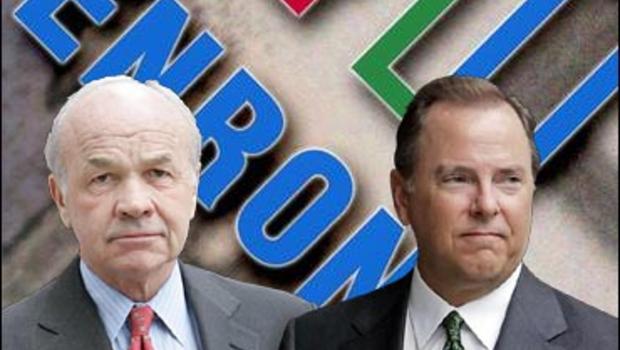 U.S. District Judge Sim Lake declared “Spring Break” at the conclusion of a short Week Nine of the criminal trial of former key Enron executives Ken Lay and Jeff Skilling as the prosecution concluded its case-in-chief and the Lay-Skilling team made final preparations for putting on its case.
U.S. District Judge Sim Lake declared “Spring Break” at the conclusion of a short Week Nine of the criminal trial of former key Enron executives Ken Lay and Jeff Skilling as the prosecution concluded its case-in-chief and the Lay-Skilling team made final preparations for putting on its case.
The break was certainly appreciated by the participants in the energy-draining trial and allowed everyone else who is following the case to step back and evaluate where the trial stands.
My experience is that it is almost impossible to understand the dynamics of a particular trial fully unless one sits in the courtroom and watches the trial each day.
Although I have read the entire trial transcript to date, I have only been able to sit in on the trial on a few occasions, so I certainly do not have as good a perch to view the trial proceedings as the primary beat reporters who are in the courtroom almost every day — Alexei Barrionuevo of the NY Times, Mary Flood of the Houston Chronicle, John Emshwiller and Gary McWilliams of the Wall Street Journal, and Carrie Johnson of the Washington Post.
Interestingly, although each has dutifully reported the presentation of the Enron Task Force’s case against Lay and Skilling, none of these day-to-day reporters have indicated that they believe the trial is a slam dunk winner for the prosecution.
At the Week Nine pole, my sense is that the prosecution has competently presented a reasonably fast-paced version of a fundamentally weak case.
That’s not to suggest that the prosecution can’t win it — indeed, weak cases are won all the time and the Task Force still has the huge advantage of the presumption that someone must be guilty of some crime whenever a company melts down in the way Enron did.
However, if the jurors have not already decided against Lay and Skilling based on that presumption, a quick glance of the Task Force’s case over the past nine weeks reveals more than enough holes through which the Lay-Skilling team could well deliver a good dose of reasonable doubt to the jury.
The week nine testimony was a case in point. Former Enron treasurer Ben Glisan completed his testimony in which, on direct, he contended that he had been advising Lay and others of Enron’s dire financial condition since mid-August of 2001 immediately after Skilling’s resignation.
However, Glisan had no meaningful documentary evidence to support his testimony on that issue, and Lay’s attorneys on cross-examination introduced Glisan’s own reports from September and October, 2001 detailing Enron’s improving finances.
In fact, on October 8, Glisan told Enron directors that the company was “on target” to meet its year-end liquidity goals and it would hold onto its investment-grade credit rating, calling a lowered outlook the “most likely worst-rating outcome” from its third-quarter earnings report. Glisan also transmitted an October 17 Deutsche Bank credit analysts’ report to Mr. Lay and others that noted Enron’s “liquidity remains solid.”
But lack of documentary evidence to support testimony and contradictory documentary evidence in regard to such testimony are not the only problems for the prosecution. Virtually every material prosecution witness — including Glisan — testified that they initially lied to investigators when they denied that they did anything illegal at Enron.
Now, however, those witnesses are claiming that they are telling the truth after cutting a deal with the Task Force in return for their favorable prosecution testimony. Is the jury really going to believe that the biggest corporate conspiracy in history was hidden from everyone except these relative few Enron executives who have copped pleas, struck deals while in prison or entered into non-prosecution agreements?
Moreover, virtually none of the testimony to date has supported a key element of the prosecution’s case — the alleged huge conspiracy within Enron to cover up the wrongdoing at the company.
Despite alleging now that Lay and Skilling were involved in lying about Enron to the investment community years ago, none of the prosecution witnesses produced any corroborating documentary evidence that they had any reservations at the time about the statements that Lay and Skilling were making and none of the witnesses have testified that either Lay or Skilling at the time ever confided to them that they thought they were making misleading statements. Doesn’t sound like much of a conspiracy, does it?
Meanwhile, the Task Force has several major problems with a number of its witnesses.
Mirroring his infamous false testimony in the Enron Broadband Trial and the Task Force’s abysmal handling of that false testimony, it now appears that the prosecution team had former Enron Broadband executive Ken Rice testify in Lay-Skilling regarding a dubious presentation document that the prosecution failed to produce to the defense as required before trial.
It’s usually not a good sign for the prosecution when a key prosecution witness performs so badly that the defense is considering calling the witness back to testify in the defense’s case-in-chief.
Likewise, the Task Force’s decision to go for a cheap score during the testimony of former Enron Broadband executive Kevin Hannon — he of “they’re on to us” fame — has turned into a major can of worms for the prosecution.
Understandably, the the Lay-Skilling defense is wondering why no other prosecution witness who attended that meeting testified regarding such a supposedly revealing statement by Skilling and, if they didn’t hear the statement, why that exculpatory evidence was not disclosed to the defense prior to trial?
Finally, the testimony of key prosecution witness Andy Fastow on his negotiation of a plea deal at the expense of his wife and on the “Global Galactic” memo was so bizarre that the prosecution simply elected not to attempt to corroborate Fastow’s testimony with either former Enron chief accountant Richard Causey or key Fastow henchman, Michael Kopper.
Maybe the Task Force brings in Causey as a rebuttal witness later, but, if not, then what did Causey tell the Task Force about Global Galactic?
So, midway through the corporate criminal case of the decade, the Task Force has presented a “pump and dump” case that, to a large extent, relies on a complex mix of innuendo and opinion.
According to the Task Force, Enron was so successful in making money in its trading operations that it allowed Lay and Skilling to soft-pedal to the markets the losses that Enron was incurring in a couple of less successful parts of the company’s business.
The Task Force does not contend that either Lay or Skilling was involved in approving fraudulent accounting, but rather that mainly Skilling engineered a reorganization of a poorly-performing Enron business unit in a manner that hid losses of that unit underneath the blanket of high profits of Enron’s trading unit.
The alleged hiding of these losses, along with over-reserving to hide excess profits of the trading unit, allowed Skilling and Lay to misrepresent Enron to the investing public as a stable logistics company rather than the more volatile trading company that prosecutors allege that Enron had become.
That theory of the case plays heavily on “the presumption” in such cases — i.e., that Lay and Skilling are rich and Enron collapsed, so they must be guilty of something as a result of Enron’s failure.
Come Monday, the Lay-Skilling team begins presenting its case-in-chief, which I expect to be spirited and entertaining.
However, the defense is not without its own problems, the biggest of which is its inability to obtain exculpatory testimony from numerous former Enron executives who are declining to testify on the basis of their Fifth Amendment privilege after the Task Force fingered them as targets of the Enron criminal investigation and designated them as unindicted co-conspirators in the Lay-Skilling case.
That such witnesses will likely not be testifying is a terrible injustice to Lay and Skilling. Although reasonable people can differ over whether criminalizing corporate agency costs is sound public policy, there is no question that the government’s effective preclusion of exculpatory testimony for Lay and Skilling from this trial is a serious violation of the principles of justice and the rule of law upon which our criminal justice system is based.
If the government believes that those important principles must be shoved aside to obtain successful prosecutions of questionable business judgments, then isn’t that a blue ribbon reason to re-think the prosecution of such cases altogether?
Like this:
Like Loading...
 Former Houstonian Randy Quaid, the fine character actor who is a product of Sidney Berger‘s outstanding theatre department at the University of Houston, is making news these days in the courtroom — he is suing the producers of the recent hit movie Brokeback Mountain for $10 million in damages for misleading him to contribute his talent to the film in a supporting role. Here is the Variety article on the lawsuit.
Former Houstonian Randy Quaid, the fine character actor who is a product of Sidney Berger‘s outstanding theatre department at the University of Houston, is making news these days in the courtroom — he is suing the producers of the recent hit movie Brokeback Mountain for $10 million in damages for misleading him to contribute his talent to the film in a supporting role. Here is the Variety article on the lawsuit.


 In an extraordinary development, the Fifth Circuit Court of Appeals this afternoon — just three weeks after oral argument in the appeal by four Merrill Lynch executives of their convictions in the controversial Enron-related Nigerian Barge case — ordered former Merrill Lynch executive
In an extraordinary development, the Fifth Circuit Court of Appeals this afternoon — just three weeks after oral argument in the appeal by four Merrill Lynch executives of their convictions in the controversial Enron-related Nigerian Barge case — ordered former Merrill Lynch executive 




